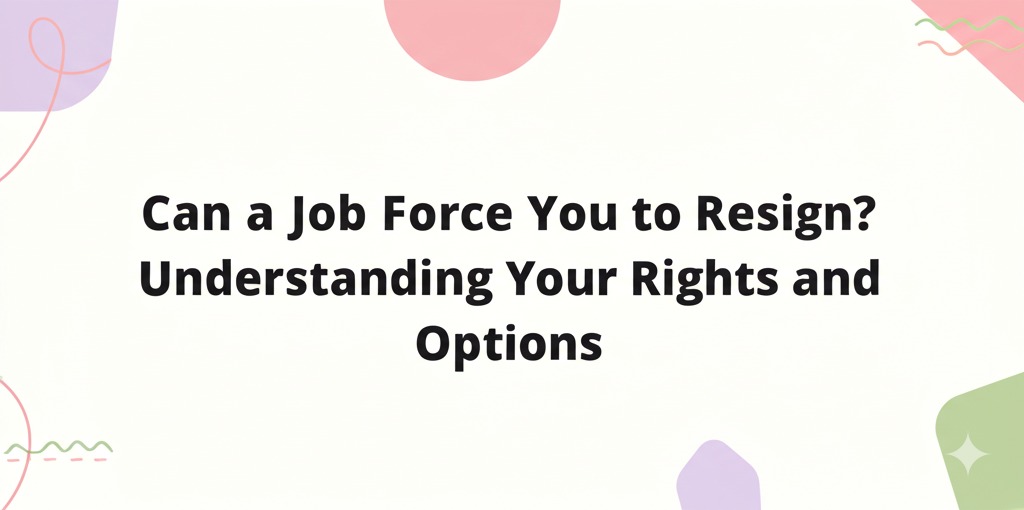
When faced with an uncomfortable work situation, it’s natural to question if your employer can force you to resign. Whether you’re experiencing an abusive work environment, pressure to leave, or simply struggling with a difficult boss, knowing your rights is crucial. In this article, we’ll explore whether your job can truly force you to resign, what your legal rights are, and how to navigate such situations with confidence.
Can Your Job Force You to Resign?
The Short Answer: No, Your Employer Cannot Force You to Resign.
While your employer can pressure you to leave or create an environment that makes staying difficult, they cannot technically force you to resign. Resignation is a personal decision, and legally, it must be made by the employee. However, certain actions from your employer might push you toward resigning.
What Are the Signs That Your Employer is Pushing You to Resign?
1. Constructive Dismissal
Constructive dismissal occurs when an employer’s actions make it impossible for an employee to continue in their role. This could involve a sudden change in job responsibilities, demotion, or making working conditions unbearable. If your employer is engaging in any of these actions, it might be a sign that they are subtly encouraging you to leave.
2. Constant Micromanagement or Undue Pressure
While feedback is part of any job, when you’re constantly being micromanaged or pressured in ways that undermine your abilities or dignity, it can feel like an attempt to push you out. These tactics may not directly force you to resign, but they can create an intolerable work environment.
3. Harassment or Discrimination
Harassment, whether it’s sexual, racial, or another form, is illegal in most countries. If you’re being harassed at work and your employer is not taking steps to address it, they may be indirectly creating a situation where you feel forced to resign. In such cases, it’s important to seek legal advice.
4. Lack of Support or Communication
Another sign that your employer may be trying to get you to leave is a noticeable lack of support or communication. If you’ve suddenly been left out of important meetings or decisions or are receiving no direction, it could indicate a hostile environment.
Can You Legally Challenge a Forced Resignation?
1. Know Your Rights
If you feel your resignation was a result of coercion or unfair practices, it’s essential to understand your legal rights. In many jurisdictions, laws protect employees from being forced to resign under duress. For example, in the United States, the law regarding wrongful termination includes protections for employees who are pressured into resigning.
2. Keep Detailed Records
If you’re experiencing pressure to resign, document every interaction. Keep records of emails, meetings, or verbal conversations where your employer may have implied or directly suggested resignation. This documentation can be invaluable should you need to pursue legal action or file a complaint.
3. Explore Legal Recourse
If you believe you were forced to resign or were subjected to constructive dismissal, you may be entitled to legal recourse. You can file a claim with your country’s labor board or consult with an employment attorney to discuss the possibility of suing for damages or seeking compensation.
What Should You Do if You’re Being Forced to Resign?
1. Assess the Situation
If you feel that your employer is pushing you out, take a step back and assess the situation. Are they making your work environment unbearable? Are you being unfairly treated or harassed? Understanding the gravity of the situation will help you decide your next steps.
2. Speak to HR
If possible, speak with someone from the Human Resources (HR) department. HR is there to ensure that workplace policies are being followed, and they may be able to mediate the situation. If your employer is truly creating a hostile work environment, HR may intervene to resolve the issue.
3. Consider Your Options
If you feel that the situation is untenable, you might start considering your options. Sometimes, the best course of action is to look for another job. However, if you feel your rights have been violated, seeking legal counsel could help you better understand your options.
4. Know When to Walk Away
If you’ve weighed the pros and cons and determined that resignation is the best option for your mental or physical health, then you may choose to leave. However, it’s crucial to leave on your own terms, not because you were pushed out by your employer’s unfair tactics.
Key Takeaways
- Your employer cannot force you to resign; resignation must be voluntary.
- Constructive dismissal, harassment, micromanagement, and a lack of support are all signs your employer might be pressuring you to leave.
- Legal recourse is available if you feel coerced into resignation or if your rights have been violated.
- Always document everything if you feel forced to resign, and consider seeking legal advice to understand your rights better.
- If possible, speak with HR or explore other job opportunities if the situation becomes unbearable.
Conclusion: Know Your Rights and Take Action
If you feel like your job is forcing you to resign, remember that you have rights. Employers may try to push you out through various means, but you are not without options. Whether you choose to stay and fight the situation or seek a fresh start elsewhere, ensure that you are informed about your legal rights and take action to protect yourself. Always consult with legal professionals if you’re unsure about your next steps.

Andre Cuevas provides career insights, job search strategies, and professional advice to help individuals navigate the job market and achieve their career goals.





